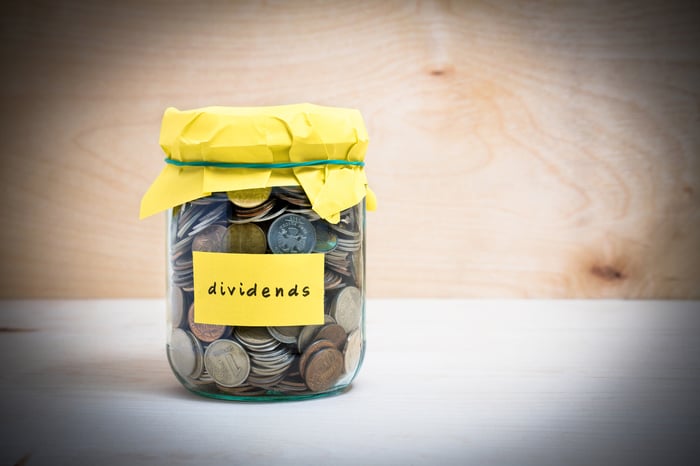If you are looking at Coca-Cola (K 0.16%) in search of safety and yield, then step back for just a second. There are other stocks out there with higher yields and just as compelling backstories. These three Motley Fool contributors say Verizon (VZ -1.74%), Pfizer (PFE 0.89%), and Enterprise Products Partners (EPD) deserve your attention. All of them provide higher yields and, notably, products and services that are vital to those who use them.
Higher yield and a wider moat
Brian Stoffel (Verizon): I'm not a dividend investor. I still have decades until my retirement, and I'm more focused on growth companies right now. But if I were on retirement's doorstep, Verizon would be a much more appealing income stock than Coke. And this goes far beyond the fact that Verizon's dividend yield -- at 4.3% -- is much larger than Coke's 3%.

Image source: Getty Images.
At its core, Coke's moat is provided primarily by its brand value. That's not surprising, as Forbes ranks it as the sixth most-powerful brand in the world. But brands aren't what they used to be. Millennials are after products that are local, from small companies, and organic. Coke doesn't check those boxes.
Verizon's moat, on the other hand, is provided via enormous barriers to entry. There are only a few national telecom players that can provide connectivity to the masses, and Verizon has the largest market share. It's also the first to offer 5G technology. Given the enormous infrastructure costs associated with the industry, don't expect any "small, local, organic" players to catch Verizon by surprise.
Just as important, Verizon's dividend is more sustainable. The company only used 58% of its free cash flow over the past year for dividend payments -- giving the company ample wiggle room. Coke, on the other hand, used 71% of free cash flow to make its payments. While that's nowhere in the danger zone, it shows that Coke may have less room to raise the dividend in the future.
Don't miss out on this 2 for 1 deal
George Budwell (Pfizer): Shares of Pfizer have been in free fall ever since the pharma titan announced a merger between its off-brand Upjohn drug unit and the struggling generic-drug king Mylan toward the tail end of July. What's been spooking investors?
Pfizer also plans on lowering its highly coveted dividend as part of this merger. That wasn't a welcome development among conservative-minded income investors, who have historically made up a good portion of the drugmaker's shareholder base. However, the income crowd may have jumped the gun in this case, thereby creating an outstanding buying opportunity for investors seeking a reliable source of passive income.
The key is that Pfizer's current shareholders will own 57% of the new, off-patented drug company once the deal closes. And this new company is expected to pay out a healthy dividend as well. In fact, Pfizer's stated goal is for the combined dividend of the two entities to equate to the drugmaker's present yield of approximately 4.16%. That's sky-high by any measure, topping Coca-Cola.
Perhaps the best part, though, is that investors will own pieces of both a compelling growth story in the smaller, more nimble Pfizer, as well as what should turn out to be a healthy cash cow in the Mylan/Upjohn combination. In short, this merger should prove to be a golden opportunity for income and growth-oriented investors alike.
Double the yield
Reuben Gregg Brewer (Enterprise Products Partners): If Coke's 3% yield sounds enticing, then Enterprise Products Partners' 6.2% should sound downright exciting. Enterprise is a limited partnership focused on the midstream energy industry. It owns the pipelines and other assets that help move oil and natural gas from where they are drilled to where they get used. With a $60 billion market cap, it is not only one of the most diversified players in the space, but it is also one of the largest.
EPD Financial Debt to EBITDA (TTM) data by YCharts. TTM = trailing 12 months.
Dividend investors will appreciate that Enterprise has increased its distribution for 22 consecutive years. That's not as good as Coke's streak of more than 50 years, but Enterprise hasn't been around that long, and 20-plus years show a material commitment to unitholder distributions.
That distribution is backed by an industry-leading balance sheet (debt to EBITDA is toward the low end of its peers and, for reference, below Coke's ratio) and solid coverage (distribution coverage was a very robust 1.8 times in the most recent quarter).
Adding to the allure, much of Enterprise's business is fee based. That means it gets paid for the use of its assets; the volatile price of oil and gas has little impact on its top and bottom lines. And Enterprise has $6 billion worth of growth projects in the works to keep its distribution streak going. Sure, Enterprise operates in a different industry than Coke. But with Enterprise's units down 30% from 2017 highs, it's worth a close look from income investors.






